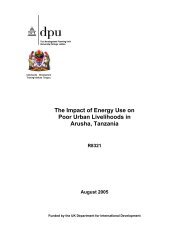EPA Review Annex Documents - DFID
EPA Review Annex Documents - DFID
EPA Review Annex Documents - DFID
You also want an ePaper? Increase the reach of your titles
YUMPU automatically turns print PDFs into web optimized ePapers that Google loves.
Resource constraints have impacted on this negotiation element through the inability to<br />
conduct required studies. For example, SPS, how many ministry people know about this? And<br />
how many laboratories does Nigeria have? Since this creates an inadequate negotiating<br />
environment, SPS is difficult for Nigeria. From this stance it is preferred to negotiate these<br />
outside the <strong>EPA</strong>.<br />
In intangible benefits, <strong>EPA</strong> is shaping the regional integration process in West Africa by<br />
bringing to the forefront for the countries in the region the reality of integration. Since creation of<br />
ECOWAS in 1975, none of the protocols signed has been fully implemented. <strong>EPA</strong> has provoked<br />
enquiries about West African regional institutions and the political exigencies of two regional<br />
institutions, ECOWAS and UEMOA, coexisting; whether a custom union in the whole of West<br />
Africa is possible with these two, and why there is no free movement in the real sense of goods,<br />
services and people in the region.<br />
In terms of capacity building, <strong>EPA</strong> has also created interest from people in international trade or<br />
trade economics, international relations, who are trying to build up their own capacities in<br />
different areas of trade. Another significant vague benefit of <strong>EPA</strong> is the involvement of NGOs,<br />
many of which have emerged with interest and objectives in poverty reduction using the trade<br />
channel, and mainstreaming women and gender issues in trade. At the regional level, it has<br />
tasked the ECOWAS Commission to take up the serious challenge of ownership of the process.<br />
This was done by the rejection of the EU’s initial plan to send consultants and economists to<br />
ECOWAS Commission to help in the technical analysis for the process, where the interest of<br />
whom they serve would be suspicious. The <strong>EPA</strong> has facilitated the awareness and use of<br />
regional and national experts which prior to the process was lacking, in particular because of<br />
scepticism regarding external consultants as the outcomes of their studies became<br />
questionable.<br />
The big four, Nigeria, Ghana, Cote d’Ivoire and Senegal, discussed their interests and aligned<br />
themselves together. For instance, there was a meeting Nigeria did not attend and Cote d’Ivoire<br />
knew the position of Nigeria and on its behalf, Cote d’Ivoire insisted on that position. However,<br />
in some instances, the smaller countries’ negotiators could take the issues personally.<br />
Therefore, the elusive benefits of negotiating <strong>EPA</strong> include provoking practical discussion<br />
about West African regional integration, as well as deep reflection and assessment of the<br />
impediments to regional trade. This reflection triggered suspicion that had not been identified in<br />
the existing cooperation between the EU and West Africa, and as a result the genuineness of<br />
the good intentions of the EU is now being painstakingly scrutinised, including the EU funding of<br />
developmental projects. The pressure to sign an agreement to conclude is another negative<br />
factor arising from <strong>EPA</strong>. The pressure to put on board all the issues including those initially<br />
rejected at the multilateral level in disregard to the recommendation of UK parliamentary<br />
committee on international trade. Despite these, there were viewpoints in Nigeria which believed<br />
in the ability of the <strong>EPA</strong> to deliver positive results, perhaps indirectly. These viewpoints<br />
supported that any concessions that Nigeria grants to countries such as China, India and Brazil<br />
in future trade agreements should be accorded to the EU without further negotiations. The main<br />
reasons for this stance is because the EU is a strategic and traditional trading partner and the<br />
long years of trade relationship has created an environment of mutual trusts absent in more<br />
recent trade partnerships.<br />
Additional resources required to conclude <strong>EPA</strong> include resources to conduct more studies<br />
and dissemination meetings/workshops. The relevance of this phase is ensure that people<br />
understand the implication of <strong>EPA</strong> for their livelihoods and to create awareness in people to<br />
139
















